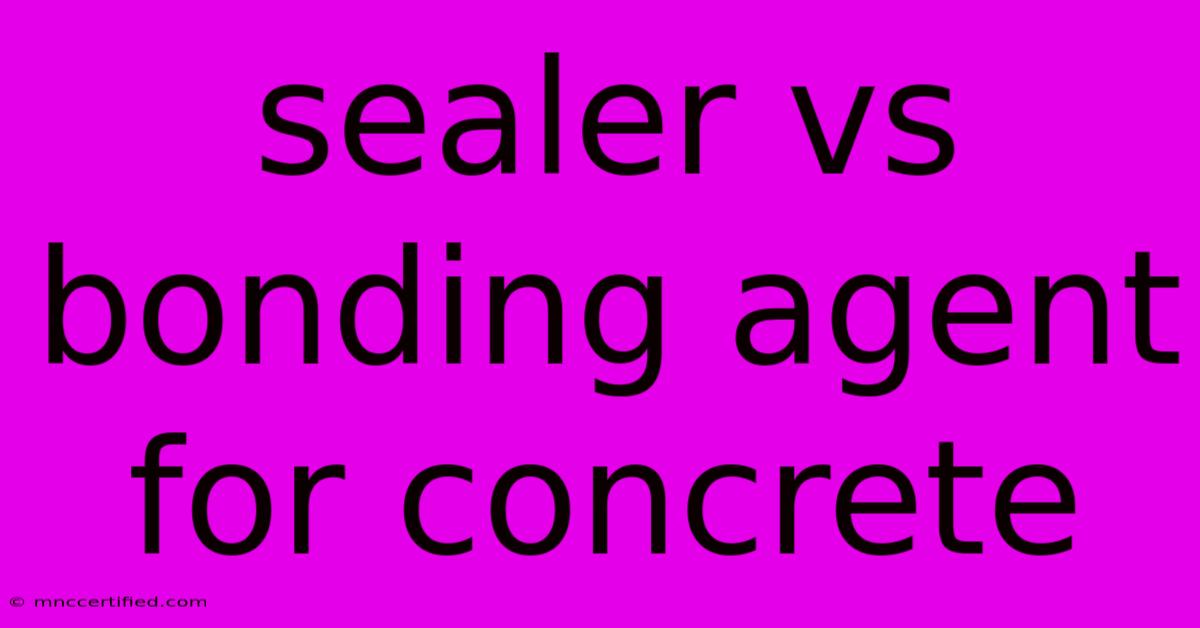Sealer Vs Bonding Agent For Concrete

Table of Contents
Sealer vs. Bonding Agent for Concrete: Choosing the Right Product for Your Project
Concrete is a durable and versatile material used in countless construction projects, from driveways and patios to floors and countertops. However, concrete can be susceptible to damage from stains, moisture, and wear and tear. To protect your concrete investment, you might consider using a sealer or a bonding agent. But which one is right for you?
This article will explore the key differences between sealers and bonding agents, helping you make an informed decision for your specific project.
What is a Concrete Sealer?
A concrete sealer is a protective coating applied to the surface of concrete to prevent damage and enhance its appearance. It forms a barrier that repels water, oil, and other stains, making the concrete easier to clean and maintain.
Here's how a sealer works:
- Penetration: Some sealers penetrate the concrete pores, creating a durable barrier from within.
- Surface Coating: Other sealers form a thin film on the surface of the concrete, acting as a protective shield.
Benefits of using a concrete sealer:
- Protection from stains: Prevents oil, grease, and other substances from penetrating the concrete.
- Moisture resistance: Reduces water absorption, preventing damage from freeze-thaw cycles and reducing the growth of mold and mildew.
- Enhanced durability: Protects against abrasion, weathering, and other forms of wear and tear.
- Improved appearance: Enhances the natural color and texture of the concrete, providing a more polished finish.
Common types of concrete sealers:
- Silane/Siloxane: A popular choice for its durability, moisture resistance, and breathable properties.
- Acrylic: A water-based sealer that offers good protection against stains and moisture.
- Epoxy: A durable and long-lasting sealer ideal for high-traffic areas.
- Polyurethane: A versatile sealer offering excellent protection against stains and moisture.
What is a Concrete Bonding Agent?
A bonding agent, also known as a concrete primer, is a liquid solution applied to a concrete surface to improve the adhesion of subsequent coatings or materials. It creates a stronger bond between the existing concrete and the new material, preventing peeling, cracking, and other adhesion problems.
Here's how a bonding agent works:
- Creates a rough surface: The bonding agent penetrates the concrete surface, creating a rougher texture.
- Improves adhesion: This rough surface provides better mechanical and chemical bonding for new materials.
Benefits of using a concrete bonding agent:
- Stronger bond: Ensures a durable bond between the concrete and new coatings or materials.
- Prevents delamination: Reduces the risk of peeling, cracking, and other adhesion failures.
- Improves the performance of subsequent coatings: Allows for a smoother and more durable finish.
- Prepares the surface for painting: Creates a suitable surface for paint adhesion.
Common types of concrete bonding agents:
- Acrylic: A water-based option suitable for most applications.
- Epoxy: A stronger and more durable option for high-stress areas.
- Polyurethane: Offers excellent adhesion and durability for various applications.
Sealer vs. Bonding Agent: Choosing the Right Product
The best choice for your project depends on your specific needs:
- If you want to protect your concrete from stains, moisture, and weathering, a sealer is the best choice.
- If you need to improve the adhesion of new materials to concrete, a bonding agent is the solution.
Here are some examples:
- Sealing a concrete driveway: Use a penetrating sealer for long-term protection against stains and weathering.
- Painting a concrete patio: Apply a bonding agent before painting to ensure the paint adheres properly.
- Applying a tile overlay to a concrete floor: Use a bonding agent to create a strong bond between the tile and the concrete substrate.
Important considerations:
- Concrete surface condition: Ensure the concrete is clean, dry, and free of loose debris before applying either a sealer or bonding agent.
- Product compatibility: Always check the product label for compatibility with the specific concrete surface and the intended use.
- Application instructions: Follow the manufacturer's instructions carefully for optimal results.
Conclusion
Both sealers and bonding agents can enhance the performance and longevity of your concrete surfaces. By understanding the specific benefits of each product, you can make an informed decision to protect your investment and achieve the desired results for your project.

Thank you for visiting our website wich cover about Sealer Vs Bonding Agent For Concrete. We hope the information provided has been useful to you. Feel free to contact us if you have any questions or need further assistance. See you next time and dont miss to bookmark.
Featured Posts
-
Week 10 Falcons Saints Game Analysis
Nov 11, 2024
-
Chargers Fulton Status Inactive In Week 10
Nov 11, 2024
-
Robbie Williams European Tour Includes Uk And Ireland Shows
Nov 11, 2024
-
Quantar Protection Insurance Blistro
Nov 11, 2024
-
Deviated Septum Covered By Insurance
Nov 11, 2024